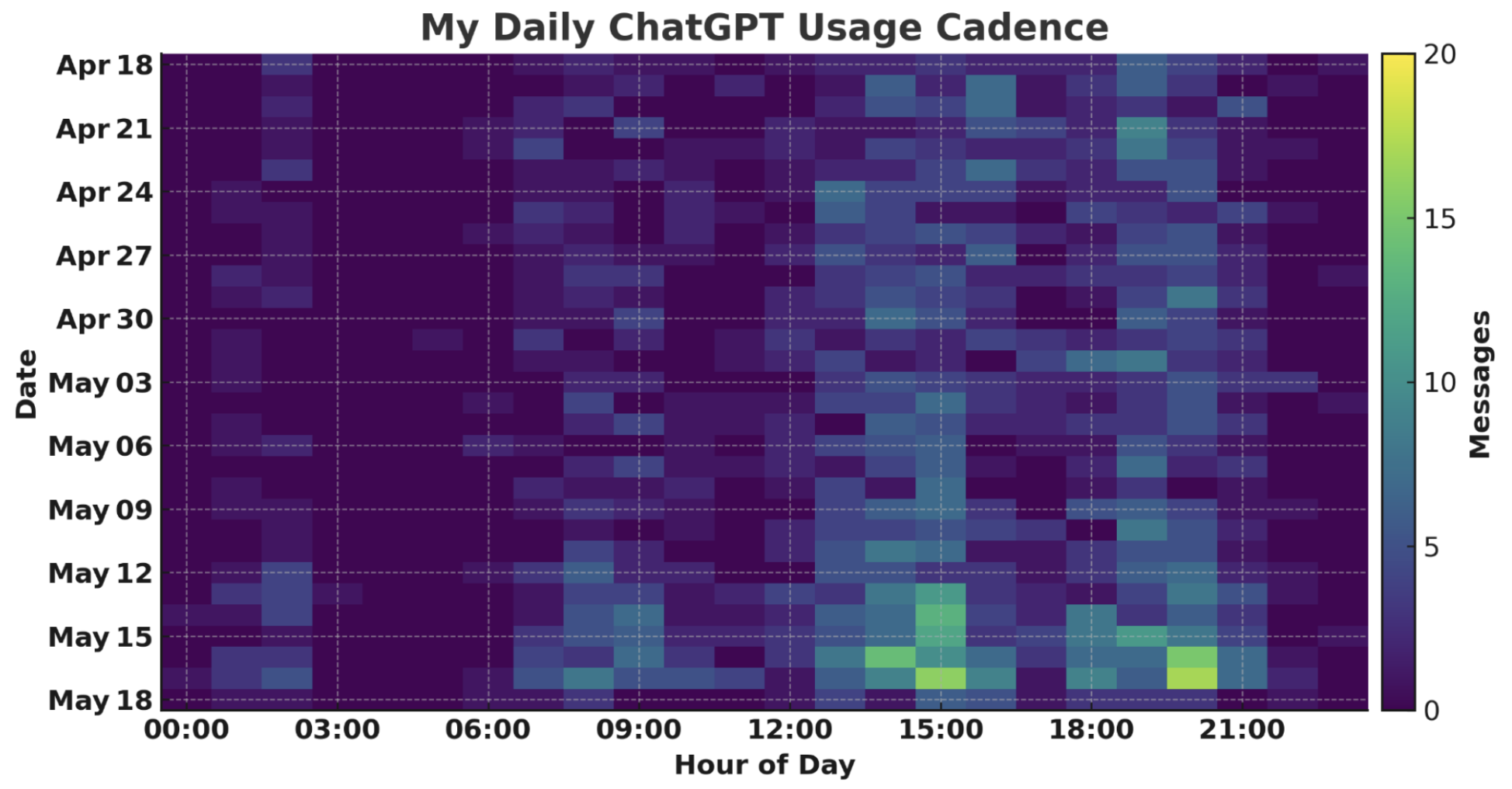Millennial Soul, Gen Z AI
A colleague once called me “a millennial soul in a Gen Z body.” She’s not wrong. I still use uppercase. What surprises me now is that my most Gen Z trait might be how I use AI.
I knew I used ChatGPT a lot, but when I pulled the data, I was startled: 1,370 messages in 30 days. One day alone I opened nine sessions and sent 120 messages. Nearly a quarter of them were about decisions I was actively weighing.
I’ve been exploring how ChatGPT’s memory and o3 functions don’t just increase productivity but deepen imagination. I’m fascinated by how AI can amplify our capacity to create. But in prompting ChatGPT o3 to analyze my own usage patterns, what stood out wasn’t the creative bursts but the consistent co-processing.
I averaged 46 messages a day. Only four days in the last month dipped below 30.
Decision prompts totaled 140 - about 10% of all messages, or five per day.
(All stats are from my personal account; o3 generated the graph and analysis.)
After influential conversations, I’d historically take to Apple Notes right after or maybe send a voice memo to a friend with whom I’ve been discussing the situation. I still do this. But now my reflex is a quick voice dictation to ChatGPT. Not because I need immediate action, but because I feel an urgency to store the raw information so that my inevitable return to those thoughts is greeted with context.
ChatGPT is not making decisions for me, but I’m increasingly eager to give it context to help me make better, more informed ones. I ask it to weigh potential paths, craft reflection prompts, or help articulate aspects of my identity and ambitions.
If I’m on my phone and sharing more than a sentence, voice dictation is my default. It’s fast and mirrors the muscle memory of sending voice messages. When I have more time and can accept space between thought and response, I switch to full voice mode. The slower conversational cadence makes me pause, and that brief separation forces perspective.
My younger sisters tease, “Yeah, why don’t you go ask Chat?” I don’t call it Chat. I don’t ascribe any companion-like qualities to this interaction. I recognize it cannot provide the emotional satiety, empathy, or joy that my relationships do, and I don’t want it to.
But I also appreciate that, if prompted well and given appropriate context, it proves to be a powerful, convenient tool that mimics aspects I value from conversations with confidants: it reflects parts of myself back to me, sharpens the real question I’m asking, and lets me see my own thinking more clearly.
It’s also available all the time and has a false sense of confidentiality.
I don’t know what to call this behavior yet, nor did I consciously recognize the habit forming. ChatGPT has become some sort of an ever-present decision mirror. Sometimes I reach for it in the heat of a moment, when I need to capture a thought or sanity check a real-time decision. Sometimes it’s just fun and feels like a grown up Magic 8-Ball.
I learned I reintroduce personal background a lot. About 9% of my messages explicitly restate prior information or situational details, with an average of 4.8 context lines per thread. I’ve chosen ChatGPT over other platforms lately because of this memory capability, but I’m still compensating for its limited access. It’s never present at the moment the context is created.
But the more I offer it, the more it reliably reflects myself back.
Perhaps this is what Sam Altman was gesturing toward when he sketched AI usage patterns across generations: older people use it like Google, millennials for life advice, but college students are using it like a personal OS, claiming they rarely make big decisions without it.
The OS metaphor feels dated, but the instinct to reflect through ChatGPT feels familiar to me.
If a whole generation is growing up able to offload thought into a system that listens, reflects, and responds at all times, we’re witnessing a profound shift in how we relate to technology - and potentially how we make decisions. I don’t know what we name this behavior or how the product form factor evolves, but I’m eager to understand how this instinct is manifesting today.
If you are a college student - or like me, finding your AI habits surprisingly Gen Z - I’d love to hear from you. Specifically, I’m curious:
What’s one personal thing you’ve asked ChatGPT?
Has it ever surprised or challenged you?
Is there a decision that now feels incomplete without asking ChatGPT first?
How do you usually interact with ChatGPT: typing, quick voice to text, or full voice conversation?
DM on X or email at caroline.ciaramitaro [at] gmail.com.
